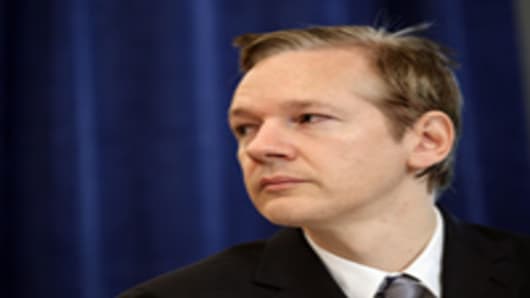Although Assange declined to name the bank or banks involved during the interview last November, he had mentioned having a hard drive of a Bank of America executive in an interview he gave a year earlier. Bank of America became so concerned that it could be the target of the leak that it formed an internal task force to investigate.
The interview took place on November 11, 2010.
And since then we've had nothing.
What's the hold up? I don't doubt that Assange is in possession of the "tens or hundreds of thousands" of documents he claims to have. But the refusal to release them is becoming weird.
John Cook of Gawker recently pointed out that Wikileaks sat on a huge cache of documents pertaining to Guantanamo Bay prisoners until the New York Times forced his hand by obtaining them from another source.
This reluctance to publish is becoming a pattern with Wikileaks. It claims it has 250,000 classified diplomatic cables, but so far it has only published 7,579, or 3 percent of the total.
Cook's theory is that Assange has come to view the unpublished documents as a form of insurance.
"That's what he called the 1.4 gigabyte encrypted file he posted to Wikileaks last year, just a month before allegations of rape surfaced against him in Sweden. The clear implication was that if anything happens to him—like, say, extradition to Sweden to face the aforementioned charges—a password would be distributed and the file made public. With each new disclosure, that insurance file affords him less and less leverage," Cook writes.
I have no particular insight into the mind of Assange. But the moral and psychological statute of limitations will eventually run out on his "ecosystem of corruption." Assange first mentioned the cache of bank documents in a 2009 interview, which means that any information is likely two years old. Since that time, much of the top brass of Bank of America has left. It has a new CEO, a new CFO, a new general counsel, a new chief legal officer. Before too long, the ecosystem of corruption will merely be a historical artifact.
And Assange's promise of documents that could "take down a bank or two" will merely look like a hoax.
___________________________________________
Questions? Comments? Email us atNetNet@cnbc.com
Follow John on Twitter @ twitter.com/Carney
Follow NetNet on Twitter @ twitter.com/CNBCnetnet
Facebook us @ www.facebook.com/NetNetCNBC



